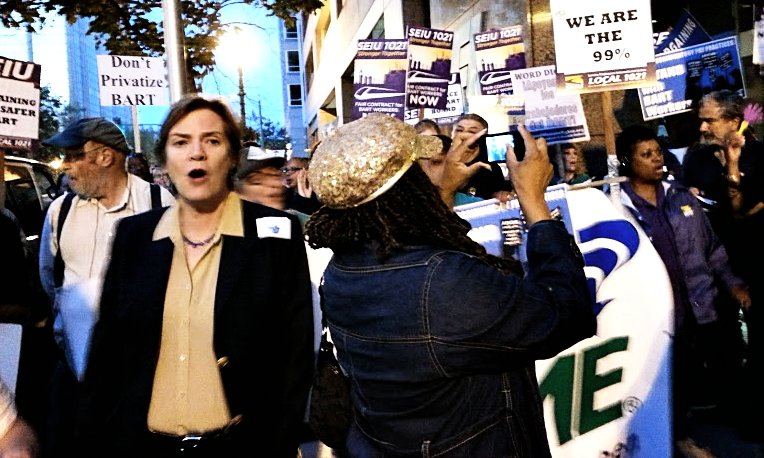

BART workers and community supporters protest at BART management offices on Oct 8.
Oakland, Calif. — More than 2,300 Bay Area Rapid Transit workers voted on a tentative agreement Oct. 26. Three unions are represented in the contract negotiations. Eighty-eight percent of Service Employees union Local 1021 workers approved the settlement, as did 85 percent of Amalgamated Transit Union 1555 workers. The American Federation of State, County and Municipal Employees, with the smallest number of workers involved, hasn’t scheduled its vote as yet, nor has the BART Board of Directors.
Workers, angry about not receiving a raise since 2009 and being forced to give up concessions worth $100 million in the last recession, struck for four-and-a-half days in July and another four days in October. However, in the months between a state-negotiated 30-day contract extension in July and a state-imposed 60-day cooling-off period, BART management, supported by local, state and federal governments, and by the mainstream media’s ongoing vicious attacks against the workers, managed to dissipate the workers’ anger.
The structural weaknesses of the unions’ negotiating efforts played right into the hands of management’s divide and conquer tactics. Why are there three separate and distinct unions representing the workers in the first place? Additionally, the struggle of the AC Transit (Alameda-Contra Costa Transit District) workers, represented by ATU Local 192, was allowed to be split off, rather than all the unions going out together. Local 192 workers have voted down two tentative agreements and are now under a separate state-imposed 60-day cooling-off period.
And how did the unions allow strike captain George Figueroa to be fired and face criminal charges, without making amnesty for him a requirement for ending the strike? Passively allowing this kind of intimidation against militant leaders will only undermine the workers’ struggle, keeping them from being able to regroup and fight back. Additionally, ATU International President Hanley weakened the strength of the negotiating team by arbitrarily imposing his power to remove Yuri Hollie, a Black woman militant, from it.
In the end, it was BART management’s own stupidity and greed that forced them to mitigate their “best and final offer” a little towards the side of the workers. Despite all the unions’ safety warnings that BART management should not be allowed to operate the trains during the strike, they tried to do it anyway. This resulted in the death of two workers, who had crossed the picket lines and were struck by a train being operated by a management trainee. The deaths so angered the public that management was forced to better their offer to the unions.
According to the San Francisco Chronicle, the agreement is “a four-year contract with a 15.38 percent raise over its term and increases to employee health and pension contributions. The net difference amounts to a 2 percent pay increase over four years, the union said. The package will cost BART an additional $67 million per year. The contract also requires BART workers to accrue 15 years with the agency before earning lifetime health benefits under the new contract, compared with five years previously.” (Nov. 2) Retirees face an additional $44 per month in health plan costs.
BART should be organized as a real public entity, under community/labor control, rather than its current state, in which the so-called public agency is overseen by whichever bourgeois party is in control of the government at the time. A community/labor agency would see to it that the needs of the community for low-cost transit, and for good-paying jobs with decent benefits, take priority over paying exorbitant salaries to management. Corporations benefiting from BART’s ability to efficiently bring workers to their doorsteps from all over the Bay Area would be taxed to pay for these services, rather than burdening the community and workers. Under such management, there would be no need to pay $399,000 to Veolia’s union-busting negotiator, Tom Hock.
As part of Workers World newspaper’s coverage marking the 50th anniversary of the liberation of…
From the PFLP Central Media Office The following statement from the Popular Front for the…
Newark, New Jersey Over 250 people, representing over 250 New Jersey endorsing community groups, attended…
Special to Workers World The following is a press release issued on April 24, 2025,…
dear Larry Krasner, we heard you sued Elon Musk over his corrupt million election giveaways…
Unions join forces against harassment and deportation of members When 200 immigrant workers – from…